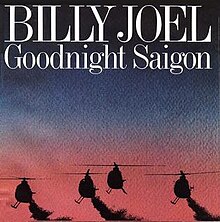Goodnight Saigon
| "Goodnight Saigon" | ||||
|---|---|---|---|---|
 |
||||
| Single by Billy Joel | ||||
| from the album The Nylon Curtain | ||||
| B-side | A Room of Our Own | |||
| Released | February 1983 | |||
| Format | CD | |||
| Recorded | Spring 1982 | |||
| Genre | Rock | |||
| Length | 7:03 | |||
| Label | Columbia | |||
| Writer(s) | Billy Joel | |||
| Producer(s) | Phil Ramone | |||
| Billy Joel singles chronology | ||||
|
||||
"Goodnight Saigon" is a song written by Billy Joel, originally appearing on his 1982 album The Nylon Curtain, about the Vietnam War. It depicts the situation and attitude of United States Marines beginning with their military training on Parris Island and then into different aspects of Vietnam combat.
The theme of "Goodnight Saigon" is the poor treatment Vietnam War veterans received. The lyrics are about Marines in battle bonding together, fighting their fears and trying to figure out how to survive. The singer, a United States Marine, sings of "we" rather than "I," emphasizing that the Marines are all in the situation together. In the bridge Joel sings of the darkness and the fear it induced in the Marines . This leads into the refrain, which has multiple voices coming together to sing that the Marines will "all go down together", emphasizing their camaraderie. Images from the war captured in the song include reading Playboy, seeing Bob Hope, listening to The Doors, smoking from a hash pipe, praying to Jesus, remembering "Charlie" and "Baker", the Company identifiers used in military units, and those in those Companies who "left their childhood / on every acre", many of whom died in the fighting. Joel has said that he "wasn't trying to make a comment on the war, but writing about the soldier as a person." According to Rolling Stone critic Stephen Holden, "As the song unfolds, Joel's "we" becomes every American soldier, living and dead, who fought in Southeast Asia."
The song begins with the sound of crickets chirping, providing the feeling of evening coming., the sound morphing into the metallic creaking of armored vehicles moving at night. This leads into the sound of helicopters, which conjures up images of helicopters carrying their loads of Marines into battle in the Vietnam War or picking up wounded Marines. Then Joel plays a figure on the piano before beginning to sing. The opening is reversed at the end of the song, as the piano figure returns, followed by the sound of helicopters and armor, and finally the crickets, before the song comes to an end. Joel's lyrics and their anguished, strained delivery emphasizes one of the truths about war that all warriors would admit, at least among themselves: the cohesion and brotherly identification that makes the soldier fight extends to the enemy, especially a worthy one whose defeat reflects on the victors' sense of pride in the unit and its members. "And who was wrong / and who was right / it didn't matter in the thick of the fight". At that point, the "we" includes those on both sides, "go(ing) down, together".
...
Wikipedia
